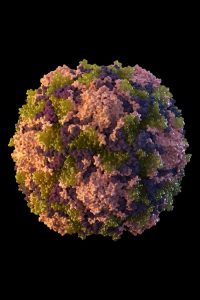By NewsDesk @bactiman63
On December 8, 2019, the Ministry of Health of Malaysia (MOH) announced that a case of polio (circulating vaccine-derived poliovirus type 1 -cVDPV1) was confirmed in Sabah. The case involved a three-month-old Malaysian boy from Tuaran, Sabah. The baby is still being treated in the hospital, being given respiratory assistance and is in stable condition.

Since the polio case was detected, to date no new polio case has been reported. As of December 14, 2019, the precautionary measures taken and ongoing are as follows:
Acute Flaccid Paralysis (AFP) case detection activity showing symptoms of poliomyelitis (a proxy for poliomyelitis) in the area around the case is being expanded to nearby and at risk areas. A total of 1,553 people were examined, and none of the AFP symptoms were detected;
Stool sampling from 20 of the baby’s close contacts was carried out for laboratory testing and is pending;
Six environmental samples from the affected area and area were taken for detection of the presence of polio virus and are awaiting laboratory results;
Monitoring the presence of polio virus in the environment through wastewater sampling is also carried out at six selected sewage treatment plants in Sabah. To date, no wild polio-virus or vaccine-derived poliovirus (VDPV) has been detected in environmental samples;
Immunization activities for immunized children in case and nearby areas are implemented to ensure increased coverage of polio immunization. As of December 14, 2019, 59 children between the ages of 2 months and 15 years in the area who were immunized were given polio vaccines. All of them are non-citizen children;
To help prevent the spread of polio virus, additional immunization activities will be provided to all children under the age of five in Sabah. Careful planning is underway and additional immunizations will be carried out as soon as possible;
Subscribe to Outbreak News TV on YouTube
Health education on polio and preventive measures is being carried out in the affected areas and to the public through various approaches such as through social media, individual education, distribution of health education materials, lectures and others;
and all health facilities have been directed to ensure that all AFP cases are monitored and carried out for polio virus detection.
MOH is also working closely with the World Health Organization (WHO) to get updates on polio situation globally. A joint venture with the United Nations Children’s Fund (UNICEF) is being refined to obtain low cost vaccine (UNICEF subsidized) vaccines for non-citizen immunization programs in Sabah. The vaccination will be carried out in collaboration with selected non-governmental organizations (NGOs). In addition, the MoH will also strengthen bilateral cooperation with the Philippine government including immunization programs for children of the nationals in Sabah.
MOH wants to emphasize that the best way to prevent polio is through immunization. Infectious diseases such as polio do not recognize boundaries. Parents are being urged to ensure that children who have been immunized are taken to a nearby Health Clinic.
- Europe: Salmonella the most common cause of foodborne outbreaks; Slovakia, Spain and Poland account for most
- Sweden ‘crypto’ outbreak update: Nearly 400 cases, Cases declining
- African Swine Fever in Asia: Indonesia is the latest country to report an outbreak


One thought on “Malaysia: The polio outbreak in Sabah one week later”